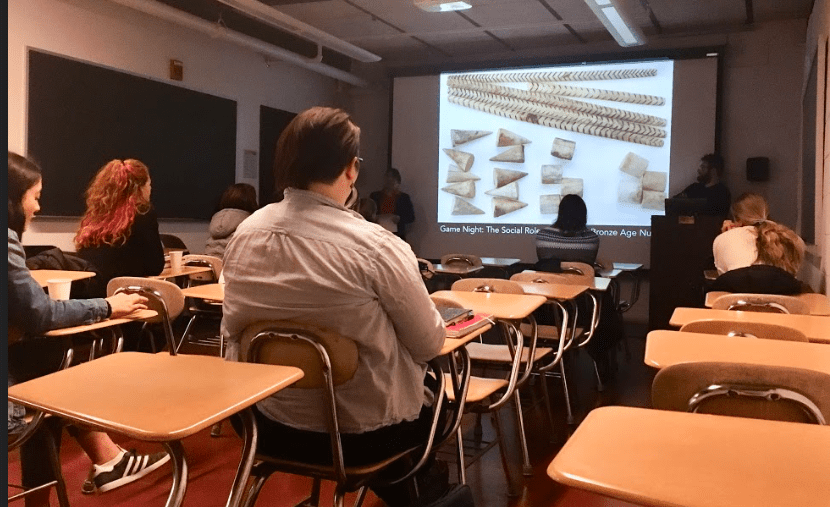Students learned about some of the original board games from hundreds of years ago at a recent lecture. Photo by Greg Clark.
A lunch and lecture for students and faculty members on how board games have impacted cultures for centuries, in ways that go beyond just entertainment purposes was held on Nov. 14, at the University of Rhode Island. The department of art and art history brought this event to the Fine Arts Center.
Professor Carl Walsh led the discussion and presentation. Walsh is teaching an introductory survey course in art history at URI this semester before he moves on to a post-doctoral research position at the Barnes Foundation in Philadelphia.
During the lunch, Walsh described his field work in Sudan, navigating the cultural and political landscape, moving into the board games and their impact and importance during the presentation.
Walsh stated that throughout history, board games have been recognized within cultures as an enjoyable way to spend time with oneself, family and friends. However, in eastern cultures, board games are also used to show acquisition of wealth and power, ritual practices, resolution of conflict and celebrating special social events.
“A lot of time they accomplish a lot different things that don’t always have to do with fun,” Walsh said. “It can also be about expressing status in society, such as if you’re really skilled in a game that may show that you’re higher in the social ladder.”
Walsh also stated that games have historically been and continue to be a tool for settling conflict, compromising and making negotiations in dire times and settings. This is most often seen through modern day “war” games.
Lisa Tom, an art history professor, stated that the lunch and lecture were both important for students to be able to see the versatility of art history, archaeology and the humanities as a whole, due to the skills of investigation they carry.
“Research on games and gameplay, like the history of sports, is a very new and burgeoning field into something that is so pervasive in our societies,” Tom said.
Focusing on the social roles of the ancient African kingdom Kerma, modern day Sudan, Walsh discussed how these games were apart of a wider phenomenon of social stratification and minimizing friction between the Kerman’s and their Egyptian neighbors.
“Dr. Walsh gave us a glimpse into the social and cultural exchanges associated with ancient games, as well as the challenges as an archaeologist of trying to understand the materiality and nature of surviving game pieces that don’t come with an instructional manual,” Tom said.
Tom said that she believed it was important for students to see the opportunities and potentials in the study of games.
“It’s odd that games has been overlooked for so long, especially considering the prevalence and social engagement with games today, from board games to online role-playing games.”




